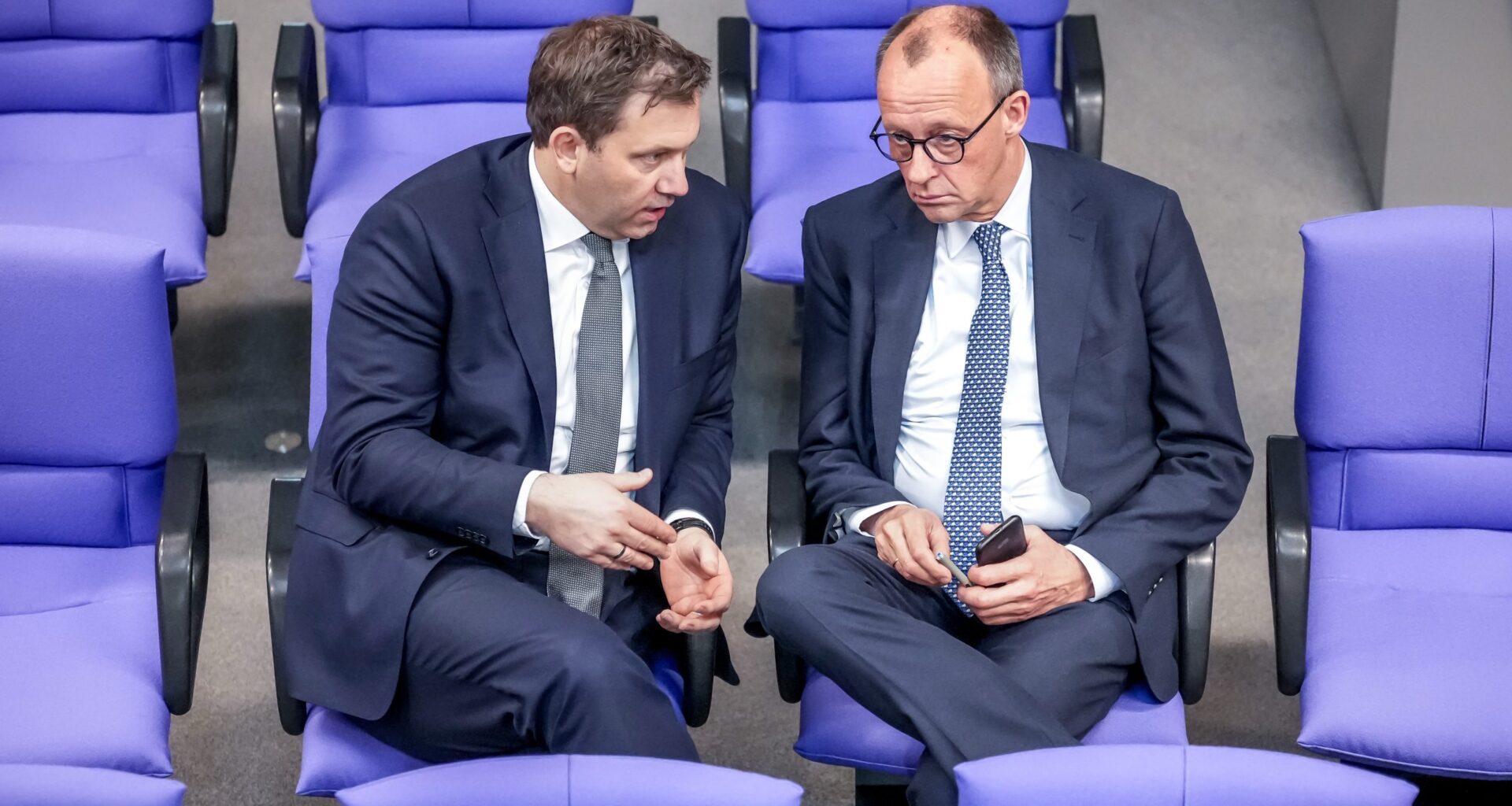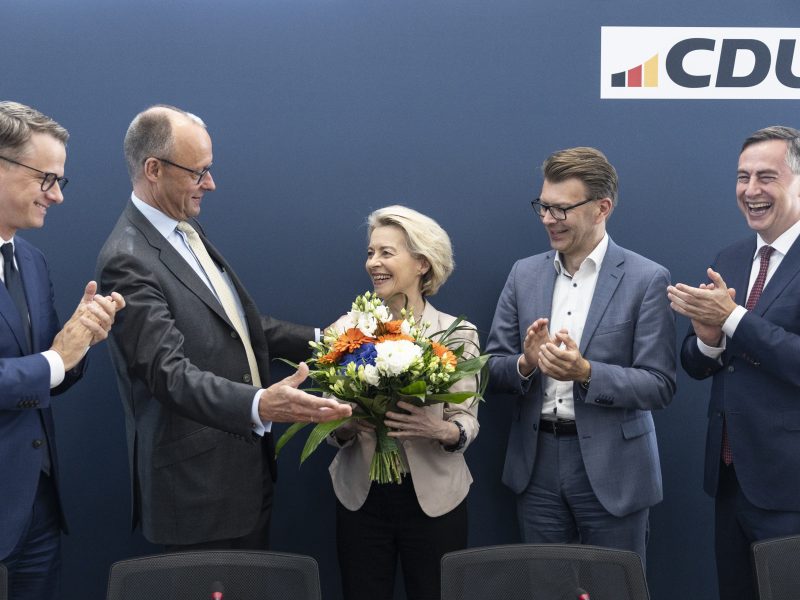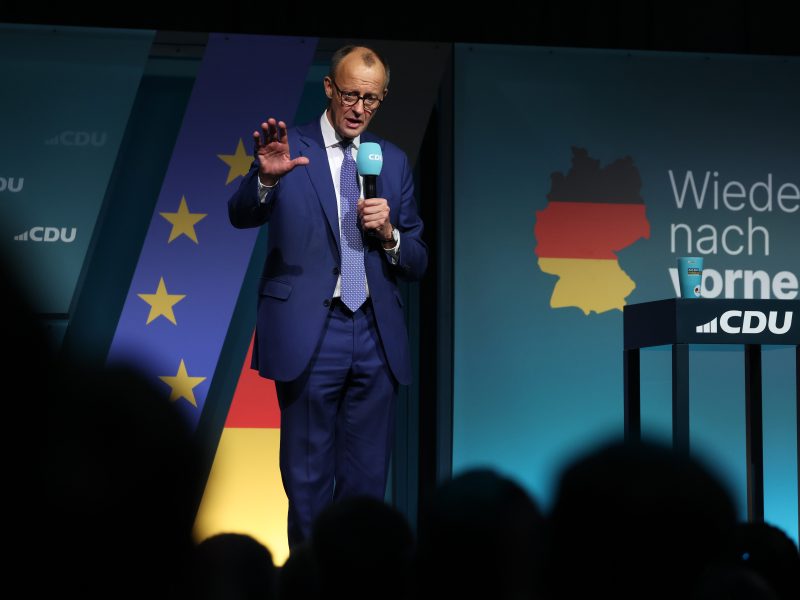BERLIN – Germany’s next coalition government is aligned in a radical push to strengthen the EU’s security capabilities but still disagrees on how to overcome the obstacle of its own indecision, according to a draft of the coalition agreement.
The draft, whose authenticity was verified by Euractiv, emerged from ongoing coalition talks between the Christian Democrats and the Social Democrats. Several subgroups had previously been hammering out the details of a future coalition agreement, with the final sticking points due to be resolved by party leaders in the coming weeks.
Negotiators were reportedly overwhelmingly in sync on EU affairs—a key priority for the designated chancellor, Christian Democrat Friedrich Merz, who served as an MEP in the 1990s. In stark contrast to many other working groups, both sides reached common positions on all but one issue in the draft chapter, first published by the German news service Table.Briefings.
It indicates that the coalition partners will push, above all, to strengthen the EU’s geopolitical and defence capabilities “in the face of historic upheaval”.
In view of Russia’s war against Ukraine and America’s looming withdrawal from Europe’s security architecture, a “strong Germany” wants to lead on this, where the previous government mainly made headlines with a lack of external coordination and infighting on European matters.
“We will exhaust all possibilities to strengthen the EU’s ability to act and its strategic sovereignty,” the parties promised right at the top.
A geopolitical budget
In more concrete terms, the “historical challenges for Europe and our claim to a geopolitically capable EU” will be a German focus in talks on the long-term EU budget, starting in the summer.
The multiannual financial framework (MFF) should prioritise defence capabilities and competitiveness “rather than primarily following the status quo”, negotiators wrote.
They also argued that the “massively changed global situation” requires a new approach to enlargement (“a geopolitical necessity”), that provides a perspective for candidate countries that are not yet fit for full membership, for example, through gradual integration into the EU Parliament and the Council.
Likewise, parties emphasise their continued support for Ukraine for “as long as it takes” (though not “whatever it takes”, the preferred phrasing of Ukraine hawks).
They stress that majority voting must be extended to decision-making on foreign policy – in particular to prevent member states like Hungary from blocking measures like sanctions via the current unanimity requirement. The ‘passerelle clause’, a provision in the EU treaties that allows for an extension without treaty reforms, gets a nod as a potential solution.
Notably, it is not only close coordination with Germany’s traditional allies France and Poland – the Weimar Triangle – that is mentioned as instrumental for joint European action. The ‘Weimar Plus’ format, that includes Italy and Spain, also gets namechecked for the first time ever in a coalition agreement.
Merz’s power grab
Despite the assurance to pull out all the stops on strategic sovereignty, some taboos remain untouched, however.
The possibility of new EU common debt goes unmentioned, which could be used to fund higher defence spending. On the contrary, it is emphasised that Germany will not “pay for the debts of other member states”.
Most importantly, as was expected beforehand, a major obstacle to German leadership in Europe proves a towering sticking point: the German government must currently abstain from EU votes if the responsible ministries and coalition partners are unable to find a common position, which is nicknamed the ‘German Vote’.
Over the last term, in particular, abstention was a constant threat as the German government fought very publicly on files like the EU’s 2035 ban on new petrol cars, further weakening its leadership ambitions.
Both partners want to put an end to Germany’s European disarray. Yet the Christian Democrats have proposed a solution that the SPD might see as an unprecedented power grab on EU policy.
The CDU’s draft position would allow Merz to “take charge of coordination from the outset or seize it during the process if the Chancellery believes it is necessary for a consistent position of the government and the success of the negotiations”. That will reportedly be limited to problematic files only.
SPD sources had already indicated reservations beforehand about shifting additional EU policy coordination powers to the chancellery, which it shares with the Foreign Ministry and the Economy Ministry.
The party instead proposes to increase pressure to find an agreement by requiring the government to publicly communicate its position to the parliament by a certain deadline.
However, that would not satisfy the CDU/CSU, as it does not foreclose abstentions due to disagreement. Yet negotiators are said to be confident that the impasse can be resolved.
That task is now up to party leaders, who will be ironing out the tensions from today.


